仁爱英语七年级下册6、7、8单元知识点总结
(完整版)仁爱版英语七年级下全部知识点总结.doc

七年级下英语知识点总结Unit 5 Topic1㈠短语总结1.在学校大门口 at the school gate2.来学校come to school3. 去学校go to school4. 上课have class / have classes5. 步行on foot6.骑自行车ride a bike/ ride bikes/ by bike / on a bike7.坐公交by bus / take a bus8.坐地铁by subway / take the subway / on the subway9.坐飞机by plane/ take the plane / on the plane10.坐小汽车by car / in a car/ take a car/ drive a car11. 坐轮船by ship12. 坐小船by boat13. 坐火车by train / on the train14. 在我们组in our group15.一群学生a group of students16.我们中的三个人 three of us17.在平日 on weekdays18.在周末 on the weekends / at weekends19.起床 get up20.睡觉 go to bed21.早起 get up early22.回家 go home23.到家 get home24.去动物园 go to the zoo25.去公园 go to the park26.看电影 see a movie / film27.看电视 watch TV28.在晚上 in the evening / at night29.帮助父母 help parents30.做某人的家庭作业 do one’s ( my/ her/ his/ your/ their)homework31.在学校 at school32.知道 ,了解 know about / learn about33.校园生活 school life34.一个美国学生 an American student35.在美国 in America / in the U.S.A.36.许多学生 many students/ a lot of students/ lots of students37.很少 very few38.吃午饭 have lunch39.出去吃饭 eat out40.在校期 on school days41.休息一会 have a short rest/ break42.午后 after lunch43.在某人的余 in one’s ( my/ his/ her/ their⋯)free/ spare time44.打球 play basketball45.踢足球 play soccer / football46.琴 play the piano47.吉他 play the guitar48.拉二胡 play erhu49.去游泳 go swimming / go for a swim50.去划船 go boating51.球 a ball game / ball games52.一年四次 four times a year53.听音 listen to music54.read books55.看 read newspapers56.看医生 see a doctor57.去 go to the library58.一周两次 twice a week59.朋友 meet friends60.每天 every day61.在七点半 at half past seven62.一小会 for a little while / for a short time63.晚后 after supper64.吃 have dinner65.吃早 have breakfast㈡重要句型1.I usually come to school by subway.同句 : I usually take the subway to school.划部分提 : How do you usually come to school?似的有:go to school by bike=go to schoolon a bike= ride a bike to school=ride to schoolgo home by bus=go home on a bus=take a bus home2.How do you usually/ often⋯?你通常 /常怎⋯?3.It ’stime for class.=It’s time to have class. =It’s time for having class.4.What about you? =How about you?5.How often ⋯? 率,回答可以用率副: always, usually, often,sometimes, seldom, never, every day ,every +其他名或表示率的短回答表示率的短:次数 +位e.g. : once a day / twice a week / three times a month6.The early bird catches the work. ( ) 笨先7.Work / Study must come first. 工作 / 学必放在第一位!8. Classes begin at eight. =Class begins at eight.提问:What time does the class begin? / What time do the classes begin?㈢重要单词的用法1.look (感官动词 ) 看起来,后面加形容词His mother looks very young.They look very cute.Her dress looks very nice.You look very cool in this coat.2. by 介词by 后面直接加表示交通工具的名词,中间不用任何词修饰,如: by bike by +动词 ing 形式,表示通过某种方式People show love to their mothers by giving cards.You can be a good student by working hard.3.over (形容词 ) School/ Class is over.4.begin现在分词 : beginning 过去式 : beganbegin to do sth , begin doing sthHe begins to write a letter. =He begins writing a letter.如果 begin 本身为分词,只能用begin to do sthHe is beginning to run.5.listen to 听(动作), hear 听见 (结果 )6.always 反义词 never7.本话题涉及的时态为一般现在时,句中常有频率副词或表示频率的短语,如果主语为三单,动词一定要用三单!(四)易错题1.You new watch ______ (look) very nice!2.Here ______(be) some news.3.Oh, come on! It’s time_____ going to school.4.They usually go to school on ________(feet).5.In my class, forty of _______(we) go to school by bike.6.The early bird ______ (catch) the worm.7.Kangkang often _____ (ride) a bike to the park.8.What time _____ (be)school over?9.Work must come ______(once).10.It ’stime ____you to get up.11.We often _____ books in the morning.12.Jill ’s friend like ______(study) in our school.13.Mr. Wang teaches ______(we) English. _____ of us like him.14.How about ______(go) out with me?15.Most students go to school _____ the school bus.16._______ do you go shopping with your mother?A. How soonB. How farC. How oftenD. How much17. What time do you usually get up _____ weekdays?18. He ______ busy, so he has no time to play with us.A. is alwaysB. seldom isC. always isD. often is19.The last class______(finish) at twelve o’clock.20.Let’s go______(boat).21.It’stime to have breakfast. 同(义句 )______________________________________________________.22.Michael often rides a bike to school. 同(义句 )______________________________________________________.23.I always go to work on foot. (对划线部分提问 )______________________________________________________.24.My mother goes shopping twice a week. 对(划线部分提问 )______________________________________________________.25.Mary always reads books in the library. 反(义句 )______________________________________________________.26.He usually does his homework at school.否(定句 )______________________________________________________.27.They often go to school by bus in the morning. 对(划线部分提问 ) ______________________________________________________.28.Jane seldom watches TV on weekdays改.(为一般疑问句 )______________________________________________________.29.He usually has lunch at home. 对(划线部分提问 )______________________________________________________.30.Li Ping often goes to work on foot. (同义句 )______________________________________________________.31.几乎没有学生乘地铁去学校。
仁爱英语七年级下册unit6知识点

Unit 6 Our Local AreaTopic 1 Is there a computer in your study?词汇:1、in front of 在……的前面2、hear from sb. 收到某人的来信2、next to 靠近3、give back 归还4、for a while 一会儿5、go upstairs 上楼6、have a look 看一看7、put away 把……收起来8、play with a ball 玩球9、on the second floor 在第二层10、look after 照顾;照看;照料;保管二、句型:Why not go upstairs and have a look?(1) go upstairs上楼go downstairs下楼(2) have a look看have a look at… 看……have a walk散步have a bath洗澡have a swim游泳have a talk谈话have a rest休息(3) Why not+动词原形…?句型是提建议的一种表达法,形同“Why don’t + 人称代词+ 动词原形上+ …?”。
这样的句型常用来启发或建议某人做某事。
回答常用Ok, let’s…/All right./That’s a good idea.Please give it back soon.请尽快地把它还给我。
give …back:(=return)归还:代词作宾语时应放在give 和back的中间,如果是名词作宾语,可放在中间,也可放在后面。
例如:give the book back;/give back the book.give it back / give them back类似的短语还有put away, put on, try on, take off,3.Let’s play computer games for a while.让我们玩一会儿电脑吧。
仁爱英语七年级下册Unit7-unit8总复习

仁爱英语七年级下册Unit7-unit8总复习仁爱七年级下学期期末课本内容总复习Unit7 --T opic 1 When is your birthday?1. May (the) thirteenth 五月十三日2. Next Thursday下个星期四;Next year 明年;Next week 下一周3. How do you plan to celebrate it? 你打算怎么庆祝?4. plan to do sth 打算/准备做某事5. Would you like to come? 你想参加吗?--Yes, I’d lov e to. 我非常乐意去6. When were you born? 你什么时候出生的?--I was born in 1998.我生于1998年。
7. Where was he born? 他在什么地方出生?--He was born in Huilai.他在惠来出生.8. What day is it today? 今天是星期几?--It’s Monday. 星期一What’s the date today?今天是几号?--It’s May 1s t. 5月1号9. in 用于表示周、月、季节、年,泛指上午、下午、晚上;10. on 用于星期,某日,某一天的上午、下午(具体某一天时,常用on)I was born on May 22nd,1967 . 出生于1967年5月22日。
11. Nineteen seventy-six 1976年; Two thousand and two 2002年12. What’s the shape of your present?= What shape is your present?你的礼物是什么形状的?-- It’s round.它是圆的13. Have a look看一看Have a rest 休息一会儿Have a swim 游泳Have a walk 散步14. just now 刚才=a moment ago 刚才15. How wide[waid] 多宽How long 多长How far 多远How often 多久一次(频率)16. use…for…用…做…--What do we use it for?我们用它做什么呢?--We use it to studyEnglish. 我们用它用来学习英语17. Must be 一定是Topic 2 Can you sing an English song?18.I’d like to play the piano 我想弹钢琴19. Sing with me 和我一起唱★Dance the disco跳迪斯科舞★P erform ballet 跳芭蕾舞20. ★Ride a bike 骑自行车★Drive a car 开车★Fly a kite 放风筝★play the guitar 弹吉他★Play basketball 打篮球★Play soccer 踢足球21. No way! 没门22. You are so smart! 你太棒了!23. Take…to …把…送/带到…Take these flowers to the party 把这些花带到聚会上去24. Could only dance a little 只会跳一点点儿舞25. Be good at doing sth 擅长/在…方面做得好Michael is good at playing soccer.Do well in sth/doing sth 擅长/在…方面做得好Michael does well in playing soccer.麦克擅长踢足球26. have a good time =have a great time = have a nice time=have a wonderful time=enjoy oneself 玩得开心,过得愉快27. When I was five=at the age of five 当我五岁时28. There was something wrong with her eyes. 她的眼睛有问题29. Couldn’t see anything= could see nothing 看不见任何东西30. Life was hard to her 生活对她来说变得很艰辛31. With her mother’s help在她妈妈的帮助下32. ago 之前two days 两天之前one year ago 一年前two month 两个月前Topic 3 We had a wonderful party33. How was Kangkang’s birthday party? 康康的生日聚会怎么样?34. Recite a Chinese poem 朗读汉语诗了吗?Perform magic tricks 表演魔术Perform kung fu 表演功夫35. It’s your turn 现在轮到你了36. What’s the matter? = What’s wrong?=What’s up? 怎么啦?37. Fell down 摔倒了38. hurt oneself 伤着某人自己39. Go to the movies = see a movie 到电影院去,去看电影40. Lie to sb = tell a lie to sb 对某人撒谎41. Tell me the truth 跟我说实话42. Each of us 我们每个人43. Make a wish 许愿44. Blow the candles out = blow out the candles 吹灭蜡烛45. Best wishes 最美好的祝愿Unit8--Topic 1What’s the weather like in spring?46. What’s the weather like in spring? 春天的天气怎么样?=How is the weather in spring?47. It is warm/ cool/ cold/ hot. 天气很暖和/凉爽/寒冷/热。
仁爱版七年级英语下册第六单元各话题知识点总结
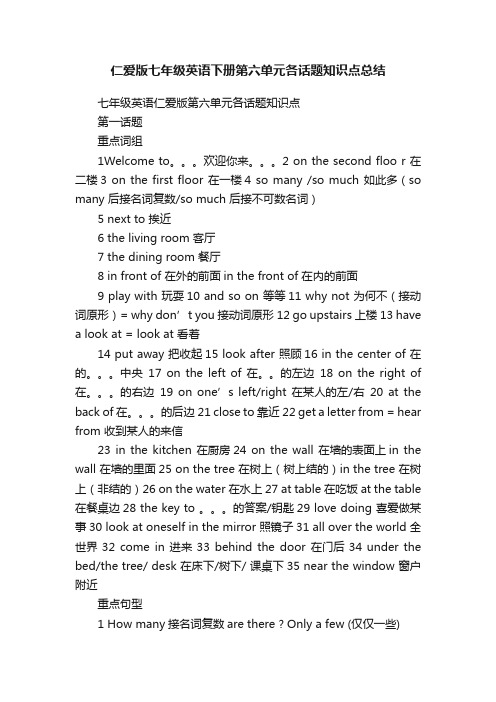
仁爱版七年级英语下册第六单元各话题知识点总结七年级英语仁爱版第六单元各话题知识点第一话题重点词组1Welcome to。
欢迎你来。
2 on the second floo r 在二楼3 on the first floor 在一楼4 so many /so much 如此多(so many 后接名词复数/so much 后接不可数名词)5 next to 挨近6 the living room 客厅7 the dining room 餐厅8 in front of 在外的前面in the front of 在内的前面9 play with 玩耍10 and so on 等等11 why not 为何不(接动词原形)= why don’t you 接动词原形12 go upstairs 上楼13 havea look at = look at 看着14 put away 把收起15 look after 照顾16 in the center of 在的。
中央17 on the left of 在。
的左边18 on the right of 在。
的右边19 on one’s left/right 在某人的左/右20 at the back of 在。
的后边21 close to 靠近22 get a letter from = hear from 收到某人的来信23 in the kitchen 在厨房24 on the wall 在墙的表面上in the wall 在墙的里面25 on the tree 在树上(树上结的)in the tree 在树上(非结的)26 on the water 在水上27 at table 在吃饭at the table 在餐桌边28 the key to 。
的答案/钥匙29 love doing 喜爱做某事30 look at oneself in the mirror 照镜子31 all over the world 全世界32 come in 进来33 behind the door 在门后34 under the bed/the tree/ desk 在床下/树下/ 课桌下35 near the window 窗户附近重点句型1 How many接名词复数are there ? Only a few (仅仅一些)2 How muc h 接不可数名词is there? Only a little (仅仅一点)语法There be 句型1 be (is /are) 采取就近原则,即最近的名词是代数或不可数用is ,最近的名词是复数用are .2 变一般疑问句把is /are 放句首肯定回答Yes ,there is/Yes ,there are.否定回答No ,there is n’t. /N o, there aren’t 句中some/something 变any /anything3 否定句直接在is /are 后加not some/some thing变any /anything .4 对该句型中的某物划线提问,用What is 加地点。
仁爱英语七年级下册语法精讲7和8单元
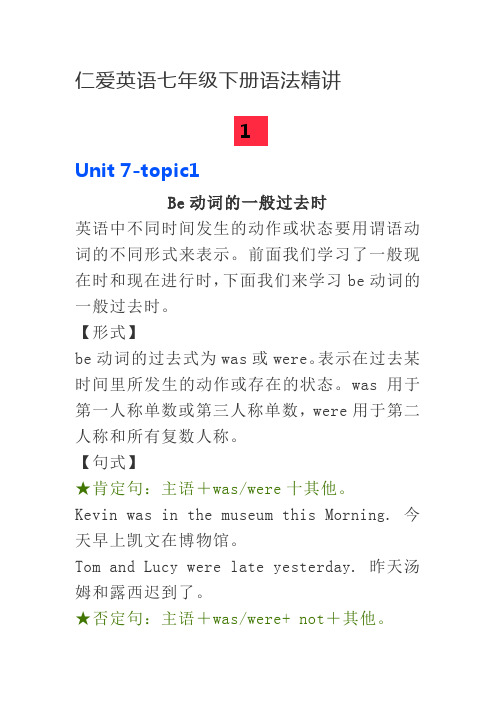
仁爱英语七年级下册语法精讲1Unit 7-topic1Be动词的一般过去时英语中不同时间发生的动作或状态要用谓语动词的不同形式来表示。
前面我们学习了一般现在时和现在进行时,下面我们来学习be动词的一般过去时。
【形式】be动词的过去式为was或were。
表示在过去某时间里所发生的动作或存在的状态。
was用于第一人称单数或第三人称单数,were用于第二人称和所有复数人称。
【句式】★肯定句:主语+was/were十其他。
Kevin was in the museum this Morning. 今天早上凯文在博物馆。
Tom and Lucy were late yesterday. 昨天汤姆和露西迟到了。
★否定句:主语+was/were+ not+其他。
They weren't athome yesterday. 他们昨天没在家。
Nancy was not late for school last Tuesday. 上周二南希上学没迟到。
★一般疑问句:Was/ Were十主语十其他?肯定回答:Yes, 主语+was/were.否定回答:No, 主语+wasn't/weren't.—Were your parents angry with you lastnight?昨晚你的父母生你气了吗?—Yes, they were.是的,他们生气了。
/ No, they weren't. 不,他们没有。
★特殊疑问句:特殊疑问词+was/were+主语+其他?How was your summer camp? 你的夏令营怎么样?Where were your new books?你的新书在哪里?基数词和序数词1. 基数词的奥妙表示数目多少的数词叫基数词。
它的构成方式是这样的:(1)1-12 为独立的单词,有其各自的形式。
如:(2)13-19都以teen 结尾,单词中的两个音节都读重音。
仁爱英语初中七年级的下册的第八单元总结复习学习知识点及典型例题.docx
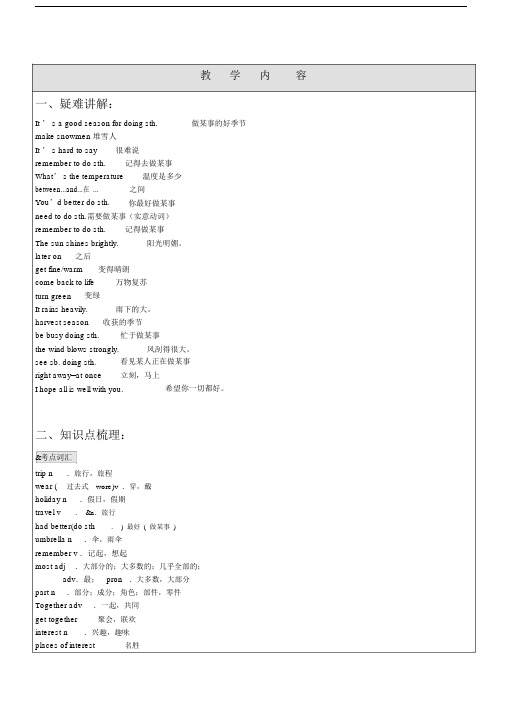
做某事的好时间
/好时节
It’s a good season for doing sth.
做某事的好季节
It’s a good time to fly/for flying kites in spring.
春天是放风筝的好时节。
remember v.记起,想起
most adj.大部分的;大多数的;几乎全部的;
adv.最;pron.大多数,大部分
part n.部分;成分;角色;部件,零件
Together adv.一起,共同
get together聚会,联欢
interest n.兴趣,趣味
places of interest名胜
立刻,马上
I hope all is well with you.
希望你一切都好。
二、知识点梳理:
&考点词汇
trip n.旅行,旅程
wear (过去式wore)v.穿,戴
holiday n.假日,假期
travel v.&n.旅行
had better(do sth.)最好(做某事)
umbrella n.伞,雨伞
3. wish v.
希望
wish to do sth.
希望、想要做某事
Everyong wishes to have a happy life.
每个人都渴望过幸福的生活。
【拓展】wish sb. to do sth.
希望某人做某事
I wish you to play football with me.
全年
miss错过
sound interesting
仁爱英语七年级下册6、7、8单元知识点总结
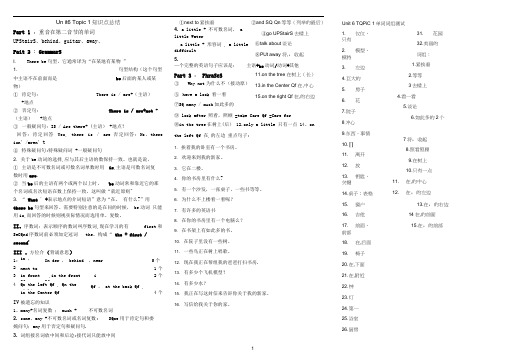
Un it6 Topic 1知识点总结Part 1 :重音在第二音节的单词UPStairS、behind、guitar、away、Pait 2 : GrammarSI. There be句型,它通常译为“在某地有某物”1. 句型结构(这个句型中主语不在前面而是be后面的某人或某物)①肯定句:There is / are+(主语)+地点②否定句:There is / are+not + (主语)+地点③一般疑问句:IS / Are there+ (主语) +地点?回答:肯定回答Yes, there is / are否定回答:No,there isn’/aren’t④特殊疑问句:特殊疑问词 +一般疑问句2. 关于be动词的选择,应与其后主语的数保持一致。
也就是说,①主语是不可数名词或可数名词单数时用is,主语是可数名词复数时用are.②当be后的主语有两个或两个以上时,be动词常和靠近它的那个名词或名次短语在数上保持一致,这叫做“就近原则"3. “ What ' +表示地点的介词短语”意为“在,有什么?”用there be句型来回答。
需要特别注意的是在问的时候, be动词只能用is,而回答的时候则视实际情况而选用单、复数。
II。
序数词:表示顺序的数词叫序数词,现在学习的有first和SeCQnd序数词前必须加定冠词the。
构成“ the + first / second'III 。
方位介词(背诵意思)1:in ,Qn ,Un der , behind,near5个2:next to1个3:in frontQf,in the frontQf ,i2个4:Qn the left Qf , Qn therightQf , at the back Qf ,in the Center Qf4个IV被遗忘的知识1。
many+名词复数; much +不可数名词2. some、any +不可数名词或名词复数; SQme用于肯定句和委婉问句;any用于否定句和疑问句.3. 词组接名词放中间和后边;接代词只能放中间4. a little + 不可数名词, alittle Watera little + 形容词 , a littledifficult5.—个完整的英语句子应该是:主语+be动词/动词+其他Part 3 :PhraSeS③Why not为什么不(接动原)⑤have a look 看一看⑦SQ many / much如此多的⑨ look after 照看,照顾 =take Care Qf =Care for⑩in the tree在树上(后) 12.only a little 只有一点 14。
仁爱版英语七年级下册知识点归纳(完整版)
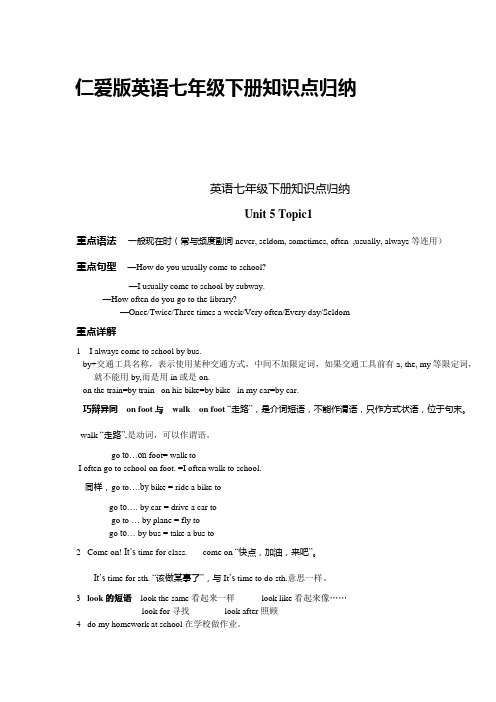
仁爱版英语七年级下册知识点归纳英语七年级下册知识点归纳Unit 5 Topic1重点语法一般现在时(常与频度副词never, seldom, sometimes, often ,usually, always等连用)重点句型—How do you usually come to school?—I usually come to school by subway.—How often do you go to the library?—Once/Twice/Three times a week/Very often/Every day/Seldom重点详解1I always come to school by bus.by+交通工具名称,表示使用某种交通方式,中间不加限定词,如果交通工具前有a, the, my 等限定词,就不能用by,而是用in或是on.on the train=by train on his bike=by bike in my car=by car.巧辩异同on foot 与walk on foot “走路”,是介词短语,不能作谓语,只作方式状语,位于句末。
walk “走路”,是动词,可以作谓语。
go to…on foot= walk toI often go to school on foot. =I often walk to school.同样,go to….by bike = ride a bike togo to…. by car = drive a car togo to … by plane = fly togo to… by bus = take a bus to2 Come on! It’s time for class. come on “快点,加油,来吧”。
It’s time for sth. “该做某事了”,与 It’s time to do sth.意思一样。
仁爱版英语七年级下册知识点复习归纳(完整版)

仁爱版英语七年级下册知识点复习归纳(完整版)Ren'ai English Grade 7 Unit 5 Topic 1 ReviewKey Grammar: Present Simple Tense (often used with adverbs of frequency such as never。
seldom。
sometimes。
often。
usually。
always)Key XXX:How do you usually come to school?I usually come to school by subway.How often do you go to the library?XXX/Three times a week/Very often/Every day/SeldomXXX:1.I always come to school by bus。
"By" is used with the name of a n method。
without any articles in een。
If there is an article such as "a," "the," or "my" in front of the n method。
"in" or "on" should be used instead。
For example。
"on the train" is the same as "by train," "on his bike" is the same as "by bike," and "inmy car" is the same as "by car." To distinguish een "on foot" and "walk," "on foot" means "walking" XXX but only as an adverb of manner at the end of a sentence。
仁爱英语七年级下册6、7、8单元知识点总结

Unit6 Topic 1知识点总结Part 1 :重音在第二音节的单词upstairs 、behind 、guitar 、away 、Part 2:GrammarsI.There be句型,它通常译为“在某地有某物”。
1.句型结构(这个句型中主语不在前面而是be后面的某人或某物)①肯定句:There is / are+(主语)+地点②否定句:There is / are+not+(主语)+地点③一般疑问句:Is / Are there+(主语)+ 地点?回答:肯定回答Yes, there is / are.否定回答:No,there isn’t /aren’t④特殊疑问句:特殊疑问词+一般疑问句2.关于be动词的选择,应与其后主语的数保持一致。
也就是说,①主语是不可数名词或可数名词单数时用is,主语是可数名词复数时用are。
②当be后的主语有两个或两个以上时,be动词常和靠近它的那个名词或名次短语在数上保持一致,这叫做“就近原则”3.“What’s +表示地点的介词短语”意为“在…有什么?”用there be 句型来回答。
需要特别注意的是在问的时候,be动词只能用is,而回答的时候则视实际情况而选用单、复数。
II.序数词:表示顺序的数词叫序数词,现在学习的有first和second.序数词前必须加定冠词the. 构成“the + first / second”III.方位介词(背诵意思)1:in , on , un der , behind , near 5个2:next to 1个3:in front of , in the front of , i 2个4:on the left of , on the right of ,at the back of , in the center of 4个IV被遗忘的知识1.many+名词复数;much + 不可数名词2.some 、any +不可数名词或名词复数;some用于肯定句和委婉问句;any用于否定句和疑问句。
仁爱七年级下册英语第6单元必考知识点
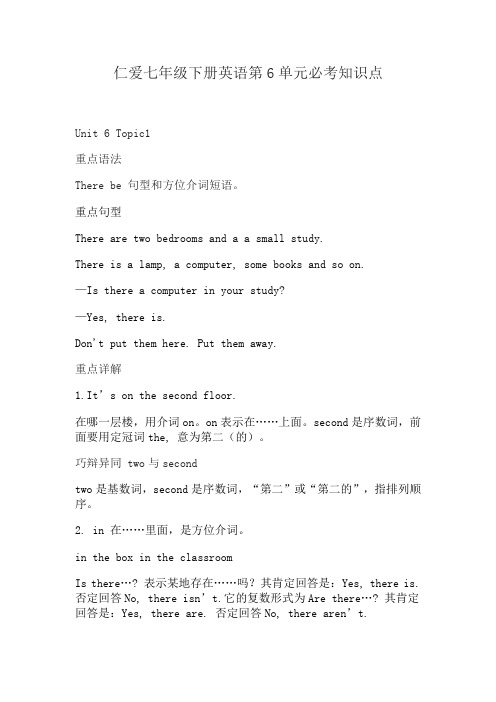
仁爱七年级下册英语第6单元必考知识点Unit 6 Topic1重点语法There be 句型和方位介词短语。
重点句型There are two bedrooms and a a small study.There is a lamp, a computer, some books and so on.—Is there a computer in your study?—Yes, there is.Don't put them here. Put them away.重点详解1.It’s on the second floor.在哪一层楼,用介词on。
on表示在……上面。
second是序数词,前面要用定冠词the, 意为第二(的)。
巧辩异同 two与secondtwo是基数词,second是序数词,“第二”或“第二的”,指排列顺序。
2. in 在……里面,是方位介词。
in the box in the classroomIs there…? 表示某地存在……吗?其肯定回答是:Yes, there is. 否定回答No, there isn’t.它的复数形式为Are there…? 其肯定回答是:Yes, there are. 否定回答No, there aren’t.3.巧辩异同 there be与 have(1) there be“有”,指(某地)存在“有”。
(2) have“有”,指人或某物“拥有”。
The is a dog in the picture. The dog has two big eyes.注:there be 遵循就近原则。
be 用is还是are,取决于离该动词最近的那个名词。
如果该名词是单数或不可数名词就用is,如果是复数就用are。
4.have a look看看。
后面接名词时要用at. 如Have a look at your watch.5.talk about“谈论,议论”,后接名词或动名词。
完整版)仁爱版英语七年级下册各单元知识点归纳

完整版)仁爱版英语七年级下册各单元知识点归纳Unit 5 Topic 1Key grammar: Simple Present Tense (often used with adverbs of frequency such as never。
seldom。
sometimes。
often。
usually。
always)Key XXX:How do you usually come to school?I usually come to school by subway.How often do you go to the library?XXX/Three times a week/Very often/Every day/SeldomXXX:1.I always come to school by bus.Use "by" before the name of the XXX。
without using any determiners in een。
If there are determiners such as "a"。
"the"。
"my"。
etc。
before the means of XXX。
"in" or "on" should be used instead.Examples: on the train = by train。
on his bike = by bike。
in my car = by car。
Differences een "on foot" and "walk on foot": "on foot" is a nal phrase that cannot be used as a predicate but only as an adverb of manner at the end of a sentence。
仁爱英语七年级下册unit6 知识点总结
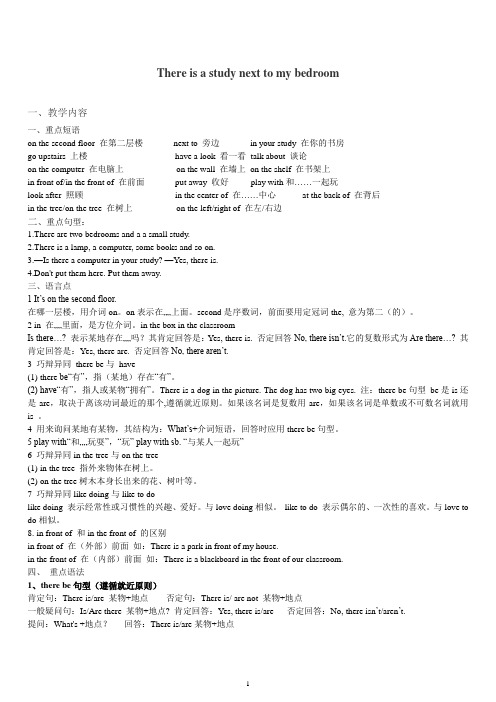
There is a study next to my bedroom一、教学内容一、重点短语on the second floor 在第二层楼next to 旁边in your study 在你的书房go upstairs 上楼have a look 看一看talk about 谈论on the computer 在电脑上on the wall 在墙上on the shelf 在书架上in front of/in the front of 在前面put away 收好play with和……一起玩look after 照顾in the center of 在……中心at the back of 在背后in the tree/on the tree 在树上on the left/right of 在左/右边二、重点句型:1.There are two bedrooms and a a small study.2.There is a lamp, a computer, some books and so on.3.—Is there a computer in your study? —Yes, there is.4.Don't put them here. Put them away.三、语言点1 It’s on the second floor.在哪一层楼,用介词on。
on表示在……上面。
second是序数词,前面要用定冠词the, 意为第二(的)。
2 in 在……里面,是方位介词。
in the box in the classroomIs there…? 表示某地存在……吗?其肯定回答是:Yes, there is. 否定回答No, there isn’t.它的复数形式为Are there…? 其肯定回答是:Yes, there are. 否定回答No, there aren’t.3 巧辩异同there be与have(1) there be“有”,指(某地)存在“有”。
仁爱教材梳理七年级unit7-8 重点 知识点
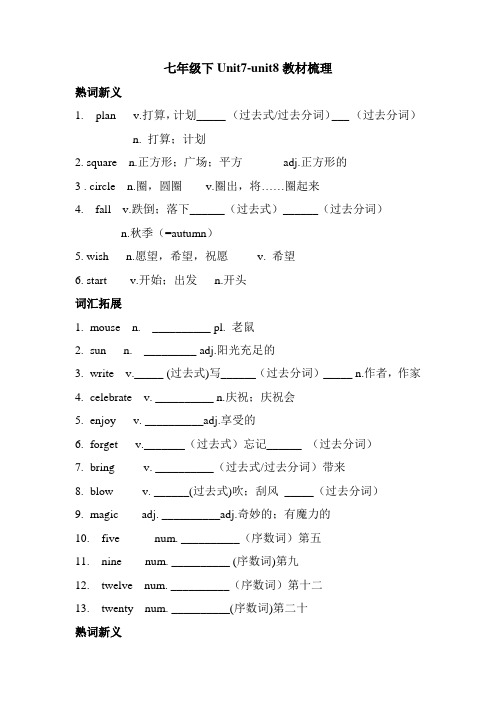
七年级下Unit7-unit8教材梳理熟词新义1.plan v.打算,计划_____ (过去式/过去分词)___ (过去分词)n. 打算;计划2. square n.正方形;广场;平方adj.正方形的3 . circle n.圈,圆圈v.圈出,将……圈起来4. fall v.跌倒;落下______(过去式)______(过去分词)n.秋季(=autumn)5. wish n.愿望,希望,祝愿v. 希望6. start v.开始;出发n.开头词汇拓展1.mouse n. __________ pl. 老鼠2.sun n. _________ adj.阳光充足的3.write v._____ (过去式)写______(过去分词)_____ n.作者,作家4.celebrate v. __________ n.庆祝;庆祝会5.enjoy v. __________adj.享受的6.forget v._______(过去式)忘记______ (过去分词)7.bring v. __________(过去式/过去分词)带来8.blow v. ______(过去式)吹;刮风_____(过去分词)9.magic adj. __________adj.奇妙的;有魔力的10.five num. __________(序数词)第五11.nine num. __________ (序数词)第九12.twelve num. __________(序数词)第十二13.twenty num. __________(序数词)第二十熟词新义1.cold adj.冷的n.寒冷;感冒2.rain v.下雨n. 雨,雨水__________ adj.阴雨的;多雨的3. snow v.下雪n.雪__________ adj.下雪的4.interest n.兴趣;关注v.使感兴趣;使关注adj. __________ 有趣的__________adj. 感兴趣的5. fun n.乐趣;快乐__________adj.奇怪的;滑稽好笑的adj. 有趣的;使人快乐的6. sweet adj. 甜的;可爱的;亲切的n. 甜食;糖果7. open v.开,打开adj. 开放的;敞开的;开着的词汇拓展1.wind n. __________adj. 多风的,风大的2.cloud n. __________ adj.多云的,阴天的3.Australia n. __________ n.& adj. 澳大利亚人;澳大利亚的4.sun n. __________ adj.阳光充足的5.leaf n. __________ pl.叶子6.Germany n. __________ adj.& n.德国的,德语7.India n. _____ adj. &n.印度人的,印第安的;印度人;印第安人8.friend n. _____ 友好的_____ n.友谊,友好,友情__________ adj.不友好的,有敌意的9.luck n. __________ adj.运气好的,幸运的__________ adv. 幸运地;运气好地10.nation n. __________ 国家的11.travel v. __________ (过去式/过去分词)旅游,旅行__________ (现在分词)__________ n.旅行者;旅游者;游客;旅客12.wear v. ______ (过去式)穿,戴_____ (过去分词)13.shine v. __________ (过去式/过去分词)发光,照耀14.prepare v. __________ n.准备;预备15.d ecide v. __________ n. 准备;预备16.b elieve v. __________ adj.可相信的;可信任的17.t reat v.& n. __________ 治疗;疗法18.hot adj. ______(比较级)较热的_____(最高级)最热的19.bright adj. __________adv.明亮地20.i mportant adj. __________ n.重要性重点短语1.玩得高兴have2.在......几岁时3.再也不,不再...4.过得愉快enjoy5.立刻,马上/6.吹灭blow7.也,还as8.穿,戴9.应该、最好(不)做had better10.后来on11.复苏、复活come12.开花、出版、发行13.在某人的帮助下14.为......准备prepare15.远离keep16.挂起17.熬夜18.敲knock19.忙于做..... be busy20.决定做某事decide21......的超级粉丝a big sb.22.在一月January23.打算做to do sth.24.举行一个生日聚会 a birthday party25.弹钢琴piano26.跳迪斯科dance disco27.暑假the summer28.带一把雨伞take umbrella29.一年到头all year30.去做礼拜church&重点句型1. —When/Where were you born?—I was born +时间/地点.2. —When is your birthday?—May 13th.3. —What's the date today?—It's May 8th.4. —What's the shape of your present?—It's round.5. —How long /wide is it?—It's 24/6.4 centimeters long /wide.6. —What do we use it for?—We use it to study English.7. —Can you dance or draw?—I can dance. I can do it a little /very well.8. —What else can you do?—I can dance and play the guitar.9. Did you hurt yourself?10. —Did you sing a song at the party?—Yes , I did. / No , I didn't.11. What happened to Michael at the party?12. What time did you come back home last night , Judy?13. How could you lie to me?14. Why didn't you tell me the truth?15. It's a good time to climb /for climbing mountains.16. Which season do you like best , spring, summer, autumn or winter?17. —What's the weather like in spring? /How is the weather in spring?—It's WaI1l1. It's a good season for flying kites.18. You need to take an umbrella when you go out.19. Winter lasts from December to February.20. I think you can go anytime.21. In Indonesia, you mustn't point to anything with your foot.22. You should /shouldn't take off your shoes.23. —How was your trip?—It was wonderful.24. —How did you travel there?—By train.25. —How long were you there?—Only five days.26. Please give my best wishes to your parents.27. I hope to get together with them.28. I'd like to visit some places of interest in China.29. Christmas is the most important festiva1 in many countries.30. In China, celebrating Spring Festival is a big event.&功能意念1. 谈论天气What's the weather like in summer?How is the weather in...?What 'a fine day!It's hot/warm/cool/cold.It's sunny/ rainy/ cloudy/windy/ snowy/foggy.What's the temperature?The low temperature is 20"C and the high temperature is 25"C.The temperature is between 20"C and 25"C.2. 计量—How long is it?—It's 20 centimeters long.—How wide is it?—It's 15 centimeters wide.How tall /high is the building?----It's 130 meters tall /high.The building has 85 floors/stories.3. 能够和不能够She can't sing any Chinese songs.—Can you dance?—Yes , I can. /Yes , a little. /Yes , very well. /No , I can't. /No , not at all.I can swim now, but I couldn't swim when I was five.He's able/unable to pass the math exam.4. 意愿和打算I want to go to England.Where do you plan to go for your holidays?Where would Tony like to go?I'11 go with you.I'm going to see my head teacher this afternoon.I'd like to make a phone call to her after class.I want/hope to find an English pen friend;'I plan to go to Hangzhou this summer.I won't see the movie again.I'm not going to buy the book.I don't want to live in the big city.&语法精选1. 掌握基数词与序数词的用法。
最全最全最新(仁爱版)英语七年级下册各单元基础知识点归纳完整版
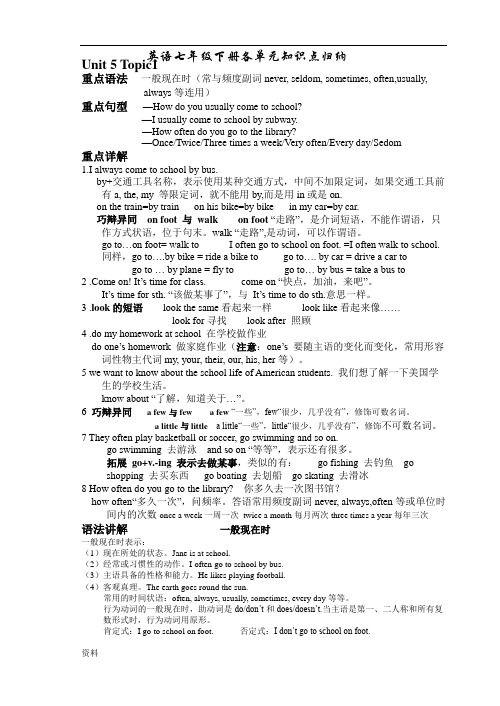
英语七年级下册各单元知识点归纳Unit 5 Topic1重点语法一般现在时(常与频度副词never, seldom, sometimes, often,usually, always等连用)重点句型—How do you usually come to school?—I usually come to school by subway.—How often do you go to the library?—Once/Twice/Three times a week/Very often/Every day/Sedom重点详解1.I always come to school by bus.by+交通工具名称,表示使用某种交通方式,中间不加限定词,如果交通工具前有a, the, my 等限定词,就不能用by,而是用in或是on.on the train=by train on his bike=by bike in my car=by car.巧辩异同on foot 与walk on foot “走路”,是介词短语,不能作谓语,只作方式状语,位于句末。
walk “走路”,是动词,可以作谓语。
go to…on foot= walk to I often go to school on foot. =I often walk to school.同样,go to….by bike = ride a bike to go to…. by car = drive a car to go to … by plane = fly to go to… by bus = take a bus to2 .Come on! It’s time for class. come on “快点,加油,来吧”。
It’s time for sth. “该做某事了”,与It’s time to do sth.意思一样。
3 .look的短语look the same看起来一样look like看起来像……look for寻找look after 照顾4 .do my homework at school 在学校做作业do one’s homework 做家庭作业(注意:one’s 要随主语的变化而变化,常用形容词性物主代词my, your, their, our, his, her等)。
仁爱英语七年级(下)-Unit-6知识点归纳

Unit 6 Our Local AreaTopic 1 I have a nice house一、词汇:1.in front of 在……的前面2.hear from sb. 收到某人的来信3.next to 靠近4.give back归还5.for a while 一会儿6.go upstairs 上楼7.have a look 看一看8.put away 把……收起来9.play with a ball 玩球10.on the second floor 在第二层11.look after 照顾;照看;照料;保管二、句型:1.Why not go upstairs and have a look?(1) go upstairs上楼go downstairs下楼(2) have a look看have a look at…看……have a walk散步have a bath洗澡have a swim游泳have a talk谈话have a rest休息(3) Why not+动词原形…?句型是提建议的一种表达法,形同“Why don’t + 人称代词+ 动词原形上+ …?”。
这样的句型常用来启发或建议某人做某事。
回答常用Ok, let’s…/All right./That’s a good idea.2.Please give it back soon.请尽快地把它还给我。
give …back:(=return)归还:代词作宾语时应放在give 和back的中间,如果是名词作宾语,可放在中间,也可放在后面。
例如:give the book back;/give back the book.give it back / give them back类似的短语还有put away, put on, try on, take off,3.Let’s play computer games for a while.让我们玩一会儿电脑吧。
最全最全最新(仁爱版)英语七年级下册各单元基础知识点归纳完整版

英语七年级下册各单元知识点归纳Unit 5 Topic1重点语法一般现在时(常与频度副词never, seldom, sometimes, often,usually, always等连用)重点句型—How do you usually come to school?—I usually come to school by subway.—How often do you go to the library?—Once/Twice/Three times a week/Very often/Every day/Sedom重点详解1.I always come to school by bus.by+交通工具名称,表示使用某种交通方式,中间不加限定词,如果交通工具前有a, the, my 等限定词,就不能用by,而是用in或是on.on the train=by train on his bike=by bike in my car=by car.巧辩异同on foot 与walk on foot “走路”,是介词短语,不能作谓语,只作方式状语,位于句末。
walk “走路”,是动词,可以作谓语。
go to…on foot= walk to I often go to school on foot. =I often walk to school.同样,go to….by bike = ride a bike to go to…. by car = drive a car to go to … by plane = fly to go to… by bus = take a bus to2 .Come on! It’s time for class. come on “快点,加油,来吧”。
It’s time for sth. “该做某事了”,与It’s time to do sth.意思一样。
3 .look的短语look the same看起来一样look like看起来像……look for寻找look after 照顾4 .do my homework at school 在学校做作业do one’s homework 做家庭作业(注意:one’s 要随主语的变化而变化,常用形容词性物主代词my, your, their, our, his, her等)。
- 1、下载文档前请自行甄别文档内容的完整性,平台不提供额外的编辑、内容补充、找答案等附加服务。
- 2、"仅部分预览"的文档,不可在线预览部分如存在完整性等问题,可反馈申请退款(可完整预览的文档不适用该条件!)。
- 3、如文档侵犯您的权益,请联系客服反馈,我们会尽快为您处理(人工客服工作时间:9:00-18:30)。
精选文本.Unit6 Topic 1知识点总结Part 1 :重音在第二音节的单词 upstairs 、behind 、guitar 、away 、 Part 2:Grammars.序数词:表示顺序的数词叫序数词,现在学习的有first 和second.序数词前必须加定冠词 the. 构成“the + first / second ”III .方位介词 (背诵意思)1:in , on , un der , behind , near 5个 2:next to 1个 3:in front of , in the front of , i 2个 4:on the left of , on the right of , at the back of , in the center of 4个IV 被遗忘的知识1.many+名词复数 ; much + 不可数名词2.some 、 any +不可数名词或名词复数; some 用于肯定句和委婉问句; any 用于否定句和疑问句。
3.词组接名词放中间和后边;接代词只能放中间4. a little + 不可数名词, a little water a little +形容词 , a little difficult5.一个完整的英语句子应该是:主语+be 动词 / 动词 +其他Part 3:Phrases①next to 紧挨着 ②and so on 等等(列举的最后) ③Why not 为什么不(接动原) ④ go upstairs 去楼上 ⑤have a look 看一看 ⑥talk about 谈论 ⑦so many / much 如此多的 ⑧put away 将……收起 ⑨look after 照看,照顾=take care of =care for⑩in the tree 在树上(后) 11.on the tree 在树上(长) 12.only a little 只有一点 13.in the center of 在…中心 14.on the left of 在…的左边 15.on the right of 在…的右边 重点句子:1.挨着我的卧室有一个书房。
2.欢迎来到我的新家。
3.它在二楼。
4.你的书房里有什么?5.有一个沙发,一张桌子,一些书等等。
6.为什么不上楼看一看呢?7.有许多的英语书8.在你的书房里有一个电脑么? 9.在书架上有如此多的书。
10.在院子里没有一些树。
11.一些鸟正在树上唱歌。
12.现在我正在帮组我的爸爸打扫书房。
13.有多少个飞机模型? 14.有多少水?15.我正在写这封信来告诉你关于我的新家。
16.写信给我关于你的家。
Unit 6 Topic 1 单词词组测试1.仅仅,只有 31.花园2.模型,模特 32.美丽的3.左边 词组:4.巨大的 1.紧挨着5.房子 2.等等6.花 3去楼上7.院子 4.看一看8.中心 5.谈论9.东西,事情 6.如此多的 2个 10.门11.离开 7将…收起 12.放 8.照看照顾 13.钥匙,关键 9.在树上 14.桌子;表格 10.只有一点 15.窗户 11.在…的中心 16.吉他 12.在…的左边17.前面,前部 13.在…的右边 18.在…后面 14在…的前面 19.椅子 15.在…的前部 20.在…下面 16.在…的后部 21.在…附近 22.钟 23.灯精选文本.24.第一 25.浴室 26.厨房 27.在楼上 28.楼层,地板 29.第二 30.卧室Unit 6 Topic 2 知识点Part 1: Words重音在第二音节的单词有:apartment 、community.Part2:Grammar1.结构(这个句型中主语不在前面而是be 后面的某人或某物) ①肯定句: There is / are+(主语) +地点 ②否定句: There is / are+not +(主语) +地点 ③一般疑问句:Is / Are there+(主语) + 地点 ?回答:肯定回答Yes, there is / are.否定回答:No,there isn ’t /aren ’t④特殊疑问句:特殊疑问词+一般疑问句2.关于be 动词的选择,应与其后主语的数保持一致。
也就是说, ①主语是不可数名词或可数名词单数时用is ,主语是可数名词复数时用are 。
②当be 后的主语有两个或两个以上时,be 动词常和靠近它的那个名词或名次短语在数上保持一致,这叫做“就近原则” 3.“What ’s +表示地点的介词短语”意为“在… 有什么?”用there be 句型来回答。
需要特别注意的是在问的时候,be 动词只能用is ,而回答的时候则视实际情况而选用单、复数。
4.There be 句型的另一重点句型There is /are ... doing sth. 有某人正在做某事 (II.)方位介词1:in , on , under , behind , near 5个 2:next to , close to 2个 3:in front of , 1个 4:on the left of , on the right of , at the back of ,in the center of , at the end of ,on the street corner, 6个 in the front of (III .)其他1.would like sb. to do sth. = want sb. to do sth.想要某人做某事2.call sb. at +电话号码3.with 具有,带有 ...... 和......4. 主语+be far from+B 主语远离B 地点5.call 。
for help6.a lot of = lots of 许多的,大量的 + 可数名词复数/不可数名词7.such as +词、词组 for example +句子Part 3:Phrases1.出租 for rent2.例如 such as 、 for example3.许多;大量 a lot of ,lots of4.靠近 close to5.远离 be far from6.住在 live in7.在街角 on the street corner 8.从…到… from... to ... 9.生活花费 the cost of living 10.在农村 in the countryside11.在…和…之间 between …and …12.想要某人做某事 would like sb. to do sth=want sb. to do sth 13.给…打电话寻求帮助 call... for help Part 4: Ad. titles (广告题目)1.出租 FOR RENT2.求租 ROOM WANTED3.寻物启事 LOST4.失物招领 FOUNDPart 5:Sentences (自己翻译,不会的看书,不允许写字)1.你住在什么种类的房子里?是一个两层排房。
2.在你的楼里有多少层?3.他正在寻找一个在我们学校附近的公寓。
4.适合学生住的小公寓(850元一个月)5.寻找一个适合两人的安静的房间(低于500元一个月)。
6.你想要我帮助你么?7.附近有么?8.在街角有一个。
9.你真好。
10.你可以帮我么?11.我住在这里。
12.有许多老人住在这里。
13.许多带有小孩的家庭也住在这里。
14.他们对彼此都很友好。
15.我们的学校离这里不远。
16.我们给它打电话寻求帮助。
17.人们都爱这个社区而且我们在这里有五彩缤纷的生活。
精选文本.18.我最喜欢书房。
19.许多人为了工作正从农村搬去城市。
20.城市大而且有趣但是他们太吵了。
21.交通很繁忙而且生活花费也高。
22.现在这些人中的一些想念农村生活。
23.在农村,有许多带有大院子的房子。
24.空气是新鲜的而且生活是安静的。
25.许多人喜欢住在那里。
Unit 6 Topic 3 知识点Part 1: Words重音在第二音节的单词有:along,across,until,obey,beforePart2:Grammar一、祈使句祈使句是用来提出要求、建议或发出命令的句子。
祈使句的主语通常为第二人称you (因为当说话时,其实就是我们对对方就是you 说的话),但是在实际应用中常常省略,谓语用动词原形,句尾用句号或感叹号。
1.肯定句型:一般以动词原形开头。
2.否定句型:一般以“Don ’t ”或“Never ”开头,翻译成:“别…”或者“不要…”3.表示建议做某事时,通常用Let 来开头。
4.有时和其它句子一起使用,常见的结构有: ①“祈使句+and+简单句”表示“……就……”. ②“祈使句+or+简单句”表示“……否则……”. 二、“When ”有两个含义:①是特殊疑问词,意为“什么时候”,用来引导问句,位于句首,句末用“?”。
②是连词,意为“当…的时候”,用来连接两个句子,位于句中,组成了复合句(也叫主从复合句),它后面引导的为从句,句末标点跟主句一致。
三、“before ”意为“在…之前”,用来引导从句,位于句中。
四、中考重点句型也是中考作文的必备句型之一: It ’s + good + to do sth. 意为“做……是好的” 五、词性和句法知识 (解题技巧类的,背了会受益一生) 1.be + 形容词,表示主语的特点2.形容词+名词,用来形容名词是……样的3.副词用来修饰动词,位于整个动作叙述完成后。
如:study hard ;4.hard 是副词修饰动作study 。
5.介词后接动词ing 形式。
6.句子结构为: 主语+be +形容词,表是主语是……样的 主语+动词+其他,表示主语做了……。
六、1.No+v-ing 。
禁止…2.序数词:first ,second ,third 使用时,前面+the3.keep+形容词4.a ticket for doing … 一张…的罚单七、情态动词:shold ,must ,can ,could ,would ,may ,have to , +动词原形 八、问路和指路 问路: 1.Where is …? 2.Is there a …near here ?3.Could you tell me the way to the …?4.Which is the way to the …?5.How can I get to the …? 指路:①G o u p / d o w n / al o n g ... t o t h e e n d .沿着…走到头。
